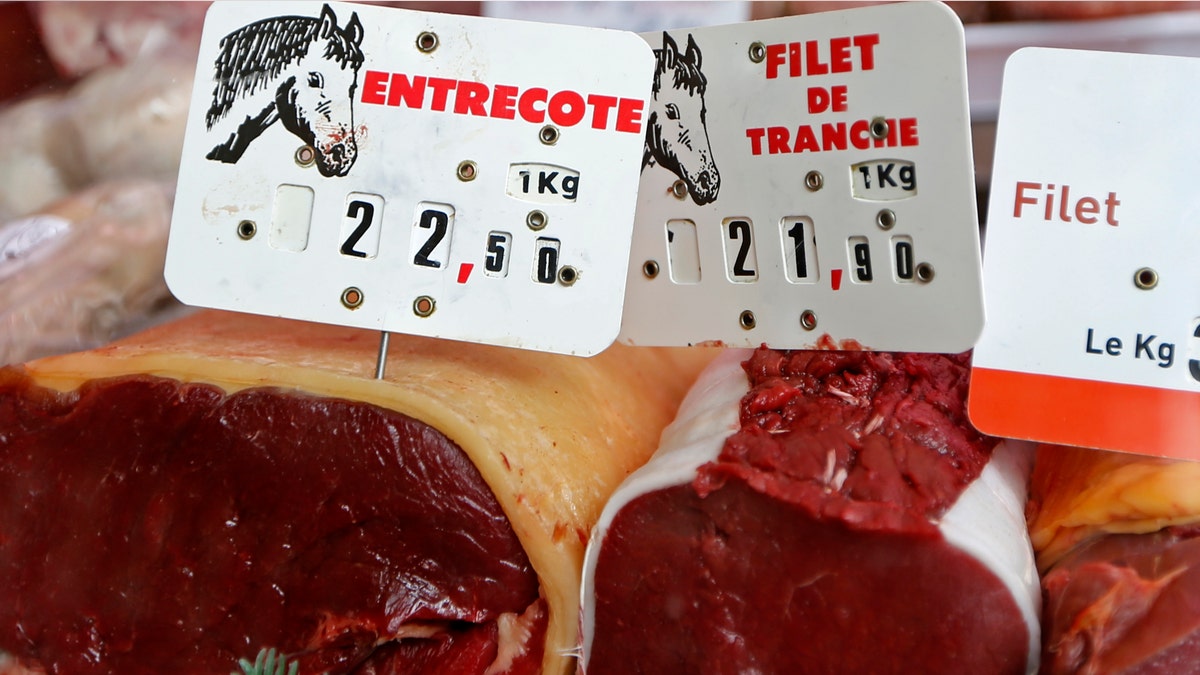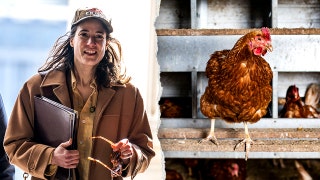
Cuts of horsemeat are displayed in a shop window at the horse butchery near Paris. (Reuters)
WASHINGTON – The slaughter of horses for human consumption could legally resume in the United States as early as this week following a decision by a New Mexico judge who dismissed a push by animal rights groups to stop the practice.
U.S. District Judge Christina Armijo in New Mexico threw out a lawsuit Friday by The Humane Society of the United States and other animal protection groups that alleged the Department of Agriculture failed to conduct environmental studies when it issued permits to Valley Meat Co. in Roswell, N.M., and an Iowa company to slaughter horses for human consumption.
It was a last-ditch effort that failed for animal rights groups. Instead, the court’s ruling ends – for now at least - a two-year battle by Valley Meat to open its slaughterhouse.
The practice of slaughtering horses for human consumption was legal and fairly common in the United States for many years.
In 2005, Congress voted to withhold funding for USDA inspections of horsemeat. It was a way to stop the slaughters because meat for human consumption at the time had to be inspected.
However, the USDA gave the OK for slaughterhouses to pay for their own inspections. Congress voted to end the practice in 2007.
The measure to stop the slaughters lapsed in 2011 and now U.S. companies are clamoring to get back into the game.
Across the country, businesses have been applying for permits with the U.S. Department of Agriculture. They want to ship horsemeat to countries where it is eaten by humans or used as animal feed.
Retail purchase of horsemeat for human consumption in the U.S. is not yet approved but the possibility could be coming.
In a statement following Friday’s dismissal, The Humane Society pledged that it would “not only appeal the decision, but also work with the states to block the plants from opening in Iowa, Missouri and New Mexico and step up its efforts in Congress to stop the slaughter of American horses.”
"With today's court ruling and the very real prospect of plants resuming barbaric killing of horses for their meat in the states, we expect the American public to recognize the urgency of the situation and to demand that Congress take action," Humane Society President Wayne Pacelle said in a statement. "Court fights and state legislative battles have been important, but this is an issue of national importance and scale, and Congress should have an up-or-down vote on the subject."
The idea of killing horses for food has triggered strong reaction among people on both sides of the issue.
Several animal rights organizations have linked legalizing the practice to horrific abuses and animal cruelty that they claim could lead to unsafe meat. They call the slaughters themselves a “brutal and terrifying end for horses.”
“Horses are shipped for more than 24 hours at a time without food, water or rest in crowded trucks,” the Humane Society says. “They are often seriously injured or killed in transit.”
Once at the slaughterhouse, the horses are stunned, the Humane Society claims, adding that because they are skittish animals by nature, the horses often “endure repeated blows and sometimes remain conscious during dismemberment.”
Supporters, though, say that claims of cruelty are overblown and that while there is some risk in transporting any animal to slaughter, it is not a common occurrence.
Supporters also say that horse slaughtering facilities in the U.S. will provide a humane alternative for aging, starving or abandoned horses by owners who can no longer afford to take care of them.
A 2011 report from the federal Government Accountability Office that shows horse abuse and abandonment have been increasing since Congress effectively banned horse slaughter by cutting funding for federal inspection programs in 2007. They say the ban on domestic slaughter has led to tens of thousands of horses being shipped to inhumane slaughterhouses in Mexico.
According to the U.S. Department of Agriculture, more than 166,000 horses were sent to Canada and Mexico last year for slaughter.
Supporters also take issue with the taboo of eating horsemeat and say the animal is consumed in countries all over the world and could be extremely profitable to American companies interested in the industry. They also argue that horses should be treated no differently than pigs, chickens and cows.
According to the Food and Agriculture Organization of the United Nations (FAO), China is one of the largest consumers of horsemeat. In France, the meat is considered to be a delicacy, sold in the same vein as veal in the U.S.
About eight miles outside of Roswell, N.M., Valley Meat, a shuttered cattle farm is almost ready to reopen its doors.
Plant owner Rick De Los Santos and his attorney, Blair Dunn, told USA Today they were surprised when they ruling came down, hours after a temporary restraining order that barred the companies from opening in August had expired.
"If I were a betting man, I probably would have lost a lot of money on this," Dunn said. "I thought the court was headed in a different direction on this since she had issued the TRO. ... I am very, very happy to be wrong."
De Los Santos estimated it would be seven to 10 days before he was up and running.
Over in Gallatin, Mo., Rains Natural Meats could open as early as today.











































